The Daily Agenda: You want to win in Tucson? Better be an incumbent.
Santa Cruz and Cunningham cruise ... No surprises in primary election ... End of the road for the midtown rat race.
Tucson voters kept their decades-long streak intact on Tuesday by helping incumbents sweep the city council primaries.
There were only two contested primary races yesterday, and neither was particularly close. Incumbent Lane Santa Cruz came away with 62% of the vote in Ward 1, while Miguel Ortega had about 38%, per unofficial results. In Ward 2, incumbent Paul Cunningham took a little more than 75% of the vote over Lisa Nutt. In Ward 4, incumbent Nikki Lee ran unopposed in the primary, as did the candidates for mayor.
Voters mailed in about 53,000 ballots, so we didn’t expect to see a lot of people heading to the polls on election day. But we were still curious, so we hit the streets yesterday to check out a few polling locations.
We spotted Ortega at a voting location downtown, on North Commerce Park Loop and North Bonita Avenue Tuesday morning. Several Santa Cruz volunteers stood on the street holding signs and Ortega was on the corner, wearing a T-shirt bearing his name, waving at cars as they approached.
But even then, he didn’t seem confident of his chances. He cautioned that an electoral loss wouldn’t be a total defeat for residents who want to preserve and improve the community.
“We on the west and south sides have won more campaigns than we’ve lost. Not just electoral campaigns, but all kinds,” Ortega said, citing campaigns to save neighborhood schools, protect open space, keep the barrios united and even introduce Mexican-American studies to school curriculums. “This is just another campaign. Win or lose, the coalition will stay intact.”
By 6 p.m., Ortega had moved to El Pueblo and was taking refuge under a tent with a handful of volunteers, as they cheered for the steady stream of voters dropping off their ballots at the end of the workday. Across the driveway, Santa Cruz’s campaign was also well-represented, with several volunteers on-hand, dancing and cheering as cars drove by.
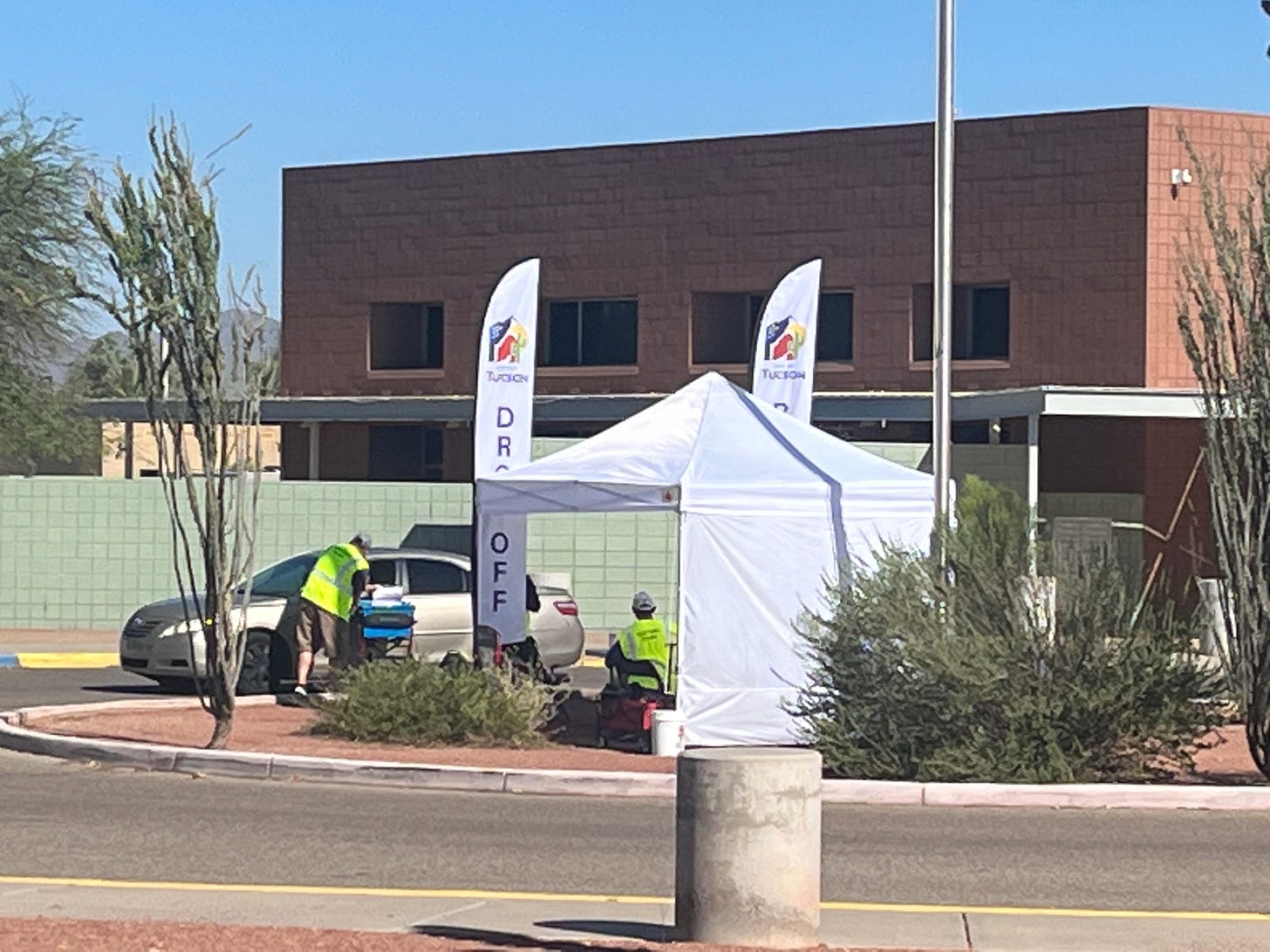
At the Morris K. Udall Park and Recreation Center on the east side, a steady drip of voters walk into the rec center, along with early-risers getting their morning workout.
“I think she’s doing an amazing job,” Robin, who only wanted to give her first name, said of Mayor Regina Romero. “The way she handles the public meetings, how she handled (Reid Park).”
Dennis Bosi turned out to support Republicans in their uncontested primary races, including voting for Republican mayoral candidate Janet Wittenbraker, who she plans to back in November.
The city actually runs “pretty smoothly,” Bosi said, but homelessness remains a big problem that the city doesn’t have the facilities to resolve, particularly when drugs are involved.
“The Grijalva family owns this city,” Bosi said. “I came out of Chicago, so this is nothing shocking to me.”
It was clear early on that the incumbents were going to win, which got us wondering: How often does that happen?
Luckily for us, the City Clerk’s Office has a handy summary of elections over the past three decades. If you want to go all the way back to 1871, the Tucson Fire Foundation has you covered.
It turns out, incumbents are now 31-0 in primaries since 1995.
Even with the general elections, pretty much the only time a new person takes over a seat on the council is when the incumbent decides not to run (in the 2000s, there were a few exceptions in Ward 6 and one in Ward 3).
For example, Jose Ibarra held the Ward 1 seat for 12 years until he decided not to run in 2007. That opened the door for Romero, who held the seat until she ran for mayor in 2019, which opened the door for her protege, Santa Cruz.
In Ward 2, Janet Marcus held the seat for 12 years, starting in 1987. Her successor, Carol West, held the seat until she decided not to run in 2007. Rodney Glassman served part of a term and then decided to run for U.S. Senate in 2010. Cunningham won that open seat, and has held it for more than a decade.
In Ward 4, Shirley Scott served for 24 years before she retired in 2019 and Nikki Lee won the election for her open seat.
All this makes for stable government, but it sure isn’t exciting.
Now that the primary election is behind us, we can look ahead to November. The Republican candidates will have their chance to challenge the Democratic incumbents, which could lead to some interesting discussions.
But we’re not holding our breath that the decades-long pattern of incumbent victories will break any time soon.
We have enough revenue to stay in business through the General Election, but we’re still a long way from guaranteeing the Tucson Agenda will survive until next year’s presidential election. Upgrade to a paid subscription and help us stick around.
PCC has a new leader: Pima Community College’s governing board voted Tuesday to appoint Dolores Durán-Cerda as interim chancellor as it continues a search for a permanent leader. The board said it’s seeking stability and continuity for the next year, as the college prepares for reaccreditation by the Higher Learning Commission. Durán-Cerda has been PCC’s Provost for six years, an administrator for 11 years and an instructor for 27 years.
Rodents-1, City-0 : Tucson City Councilman Steve Kozachik is putting the Sam Hughes rodent issue to rest, telling his Ward 6 newsletter recipients, “we’re not going to send the urban rodents packing.” Kozachik said that the best thing residents can do is protect the perimeter of their homes and manage what’s kept outside to reduce the attractiveness of the habitat.
Rezoning sought in Tubac: A Nogales real estate broker is pursuing a development plan on Tubac’s west side, involving a 64-acre proposal that would include single-family homes, townhouses and 24 acres of preserved open space, the Nogales International’s Angela Gervasi reports.
“Tubac is the gateway and the entrance (to Santa Cruz County), so we’ve got to do this right,” said developer Todd Harrison.
No reclassification for Rio Rico: A landowner has withdrawn his controversial applications to formally reclassify over 3,500 acres of land in Rio Rico, the Patagonia Regional Times reports. Landowner Andrew Jackson’s ambitious proposal was introduced to the public in mid-June and has been met with escalating criticism from residents, along with environmental organizations.
Accepting applications: The city of South Tucson opened pre-application waiting lists for the Housing Authority’s Section 8 programs Tuesday, the Tucson Sentinel reports. All pre-applications received through August 25 will be entered into a lottery for random selection. Those selected through the lottery will be placed on the wait list. South Tucson residents can start the process or find additional information at the South Tucson Housing Authority website.
44: The number of Pima County Road Condition update emails Caitlin received after Monday night’s storm, through Tuesday afternoon. This monsoon season may be off to a slow start in terms of rainfall (July saw just 2” compared to the average of 2.21”,) but the storms have left plenty of damage in their wake.


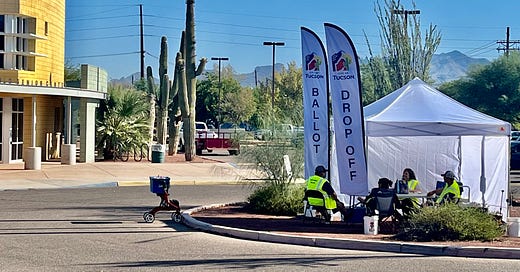



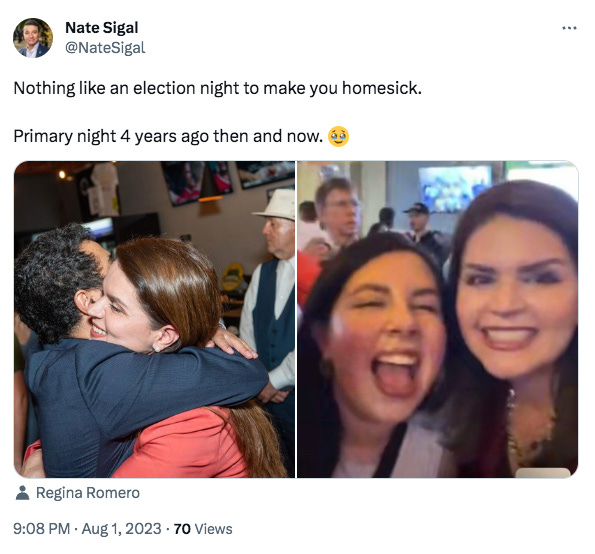
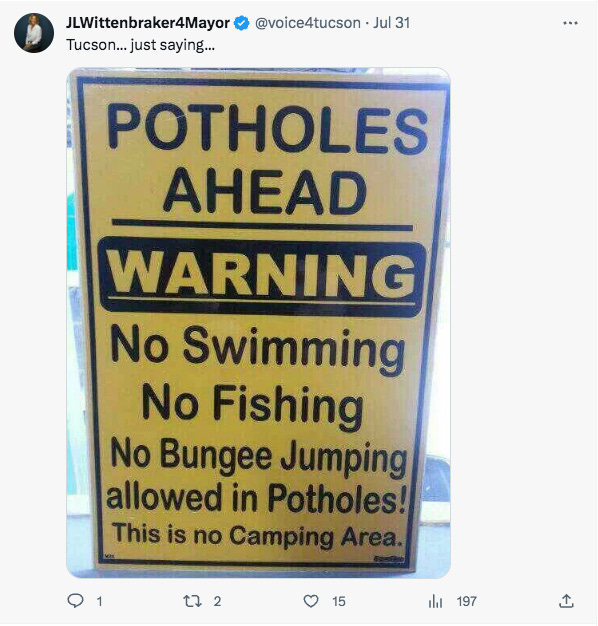




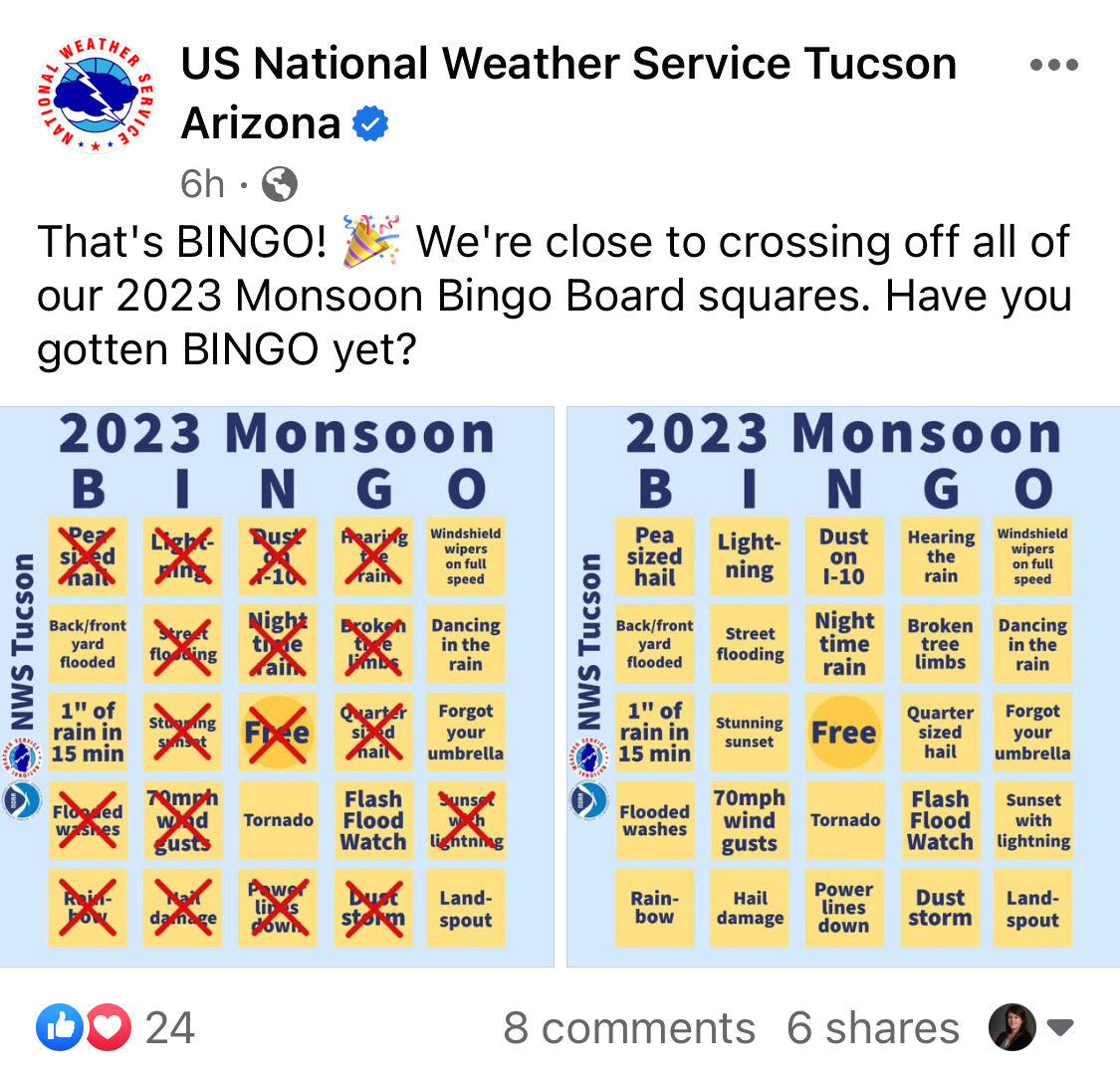
How is the Sen Wadsack recall petition progressing? One month left to sign.